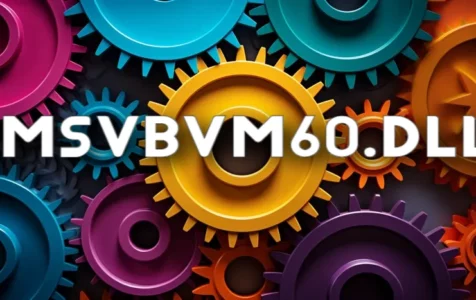MSVBVM60.DLL is an essential DLL file in Windows, part of the Visual Basic Virtual Machine. It is necessary for running programs written in Visual Basic 6.0; it enables the execution of software containing Visual Basic code and is vital for many Windows applications.
Is MSVBVM60.DLL Safe to Run? Can It Be a Virus or Malware?
Generally, MSVBVM60.DLL is a safe and legitimate file provided by Microsoft. It’s a trustworthy component of the Windows system. However, like any file, it can be mimicked or infected by malware. The legitimacy of MSVBVM60.DLL largely depends on its location in your system. The genuine file should reside in the C:\Windows\System32 folder. If you find it elsewhere, it might be a sign of a malicious file pretending to be MSVBVM60.DLL.
How to Fix MSVBVM60.DLL Related Issues?
- Manual Restoration or Replacement: If MSVBVM60.DLL is missing or corrupted, you can manually download and replace the file. It’s important to get it from a reliable source to avoid infecting your system with malware. Websites like DLL‑files.com and dlldownloader.com offer different versions of this file for download. Always choose the version that matches your Windows system.
- System File Checker (SFC): Windows’ built-in SFC tool can be used to repair corrupted system files, including MSVBVM60.DLL. To use it, open Command Prompt as an administrator and type “sfc /scannow.” This command will scan and repair system files.
- Windows Update: Keeping your Windows updated can also resolve DLL issues, as updates often include fixes and patches for system files.
- Virus Scan: Use antivirus software for a full system scan to detect malware disguised as the MSVBVM60.DLL file.
- Reinstall Application: If the DLL error is linked to a particular application, reinstall it.
- Register DLL File: Registering the MSVBVM60.DLL file in Windows may resolve the issue.
User Experiences and Community Discussions
Users report various MSVBVM60.DLL issues on forums, including installation errors, update problems, and safety concerns. Solutions discussed at forums range from file replacement to using Windows System File Checker. MSVBVM60.DLL, crucial for running Visual Basic applications in Windows, is generally safe but should be checked for malware. Resolving its issues may involve methods like file replacement, system scans, or updates, with community forums being useful for troubleshooting and advice.
